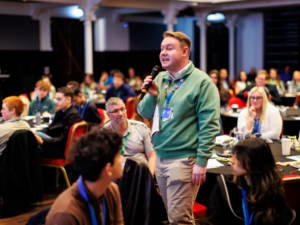At the Annual Children and Young People’s Executive Takeover 2023, Alannah Logue MSYP and Mollie McGoran MSYP gave a speech to the Permanent Secretary, Directors-General and other civil servants on youth work.
You can read our speech below:
The Scottish Youth Parliament is a youth work organisation, with youth work principles central to everything we do.
This year we created our second Youth Work and Me Report, based on consultation with the MSYPs who attended our 79th National Sitting that happened this Summer in Orkney. 86 MSYPs aged 14-25 took part and told us about their experiences of youth work.
The quotes we got back stated that “youth work is a way for young people to come out of their shell”, “express themselves and develop their skills.” “It improves relationships between generations and removes the stigma that young people are always up to no good”. And perhaps most importantly, they told us “youth work creates a safe space for young people to be themselves”.
Overall, young people told us the importance of youth work for developing skills, friendships, opportunities, and confidence. Also, if youth work did not exist, there would be more loneliness, mental health problems, anti-social behaviour and discrimination. To make a positive difference to youth work in Scotland, MSYPs wanted to see more funding and support for youth work so more opportunities are created that are inclusive, accessible, and promoted well.
Today we wanted to explain why youth work is so important to us and what steps we want to see to improve it. We’re watching the opportunities in our communities disappear; this makes me upset and angry, and something must be done
The cost-of-living crisis has been extremely challenging for young people in Scotland, but I also know it has been difficult for Scottish Government. We’ve publicly supported a number of the funding decisions Scottish Government have made during this period, perhaps most notably the increase in the Scottish Child Payment. So, I do understand the circumstances in which we’re raising youth work funding today.
I also understand that Local Authorities have a significant role to play in addressing the youth work funding challenges the country is facing. And we’ll talk later about young people, Local Authorities, and Scottish Government can work together to address these challenges.
But in this context, I still believe there are opportunities to ensure young people across the country can access high quality youth work services, regardless of where they live.
The key reason behind this is that youth work spend, is preventative spend. And if we flip the narrative and see youth work as human rights work, instead of something that is nice for young people to do after school, we see the real benefits it brings to our society.
Let’s look at mental health for example, where youth work gives young people friendships, trusted adults to speak to, and a safe place to be yourself in your community. One young person in Youth Work and Me report told us “It gives me and other young people the opportunity to express ourselves in a nonjudgmental environment.” Alongside this, 89% of respondents told us that “Youth work has benefited my health and wellbeing.”
So, youth work can help young people before they reach crisis point with their mental health, where support needs to be urgent and often significant. This also helps free up CAHMS and other mental health services to support those that need it most.
Youth work goes further than just mental health support. Unison conducted a survey, where they asked respondents from the youth work sector how they felt cuts in youth services and other relevant services were having an impact on young people. They responded with statistics such as a “77% increase mental health issues among young people, and 70% rise in alcohol and substance use” there was also an 83% reported increase in crime and anti-social behaviour.
These statistics clearly show that young people are getting themselves involved in dangerous and illegal activities due to the lack of opportunities for them to thrive in their local authority. The bottom line is young people are fed up. You can sit young people in a classroom and try to educate them on making good life choices, but you also need to give them opportunities to actually do this!
Coming from the Western Isles, youth work is a massive part of combating anti-social behaviour and loneliness within young people. Since Covid, there has been a huge increase in anti-social behaviour, this has stemmed from a lack of places for young people to go. How would you feel if a young person in your life became involved in anti-social behaviour purely out of boredom? This is a sad reality for the young people of the Western Isles, and many communities across Scotland.
For our campaign priority on treating drug-related harm as a public health issue, we spoke to different organisations working on a public health approach, including Public Health Scotland. We spoke about risk factors that increase the chances of young people experiencing drug-related harm, which include systemic issues such as poverty, trauma, and poor mental health. It is important to recognise that a public health approach calls for addressing these issues, but it also calls for increasing protective factors. These are interventions that protect young people from harm, and youth work was one of the main examples spoken about!
And we can understand why. The skills and development young people get can improve their life outcomes, helping to break cycles of poverty. The sense of belonging and making friends can help improve mental health. Usually, youth work also creates positive relationships with responsible adults who we can speak to and ask for help. All of these benefits increase protection and reduce risk, plus youth work is also actually enjoyable and entertaining! Youth work can be a lifeline for young people who face these systemic barriers. They deserve to be able to access youth worth.
Cris and Isla earlier talked about UNCRC incorporation and the potential it must improve the lives of children and young people in Scotland if done right.
Core to the success of UNCRC incorporation are moments like this – decision-makers across Scotland engaging with young people about the issues that affect us. We also need to replicate these opportunities in schools, communities, local authorities, and public bodies across the country.
Youth work is a method of participation – it is the reason we’re here today and the reason that youth voice programmes across the country engage with local authority decision-making on education and on participatory budgeting. UNCRC incorporation shows our commitment to the general principles of the UNCRC, including Article 12. But we can’t uphold that article without a thriving youth work sector that engages young people in decision-making and supports decision-makers to understand the principles of meaningful participation.
We’re here today because youth work created this opportunity. But we also have the skills, confidence and knowledge to deliver these speeches, and take part in these conversations because of the support youth work has given us. If we want to replicate these opportunities across Scotland, we also need to secure long term funding solutions for a thriving youth work sector.
The UN committee on the rights of the child stated in their report that “government should make a plan to make sure that all children have the right to play, no matter who they are and where they live.” They also state “Children should be able to learn in a creative, playful and fun environment. They shouldn’t be pressured by lots of tests and exams.”
How can these rights be upheld if youth work services are being cut left right and centre?
The cuts being made are different in every area and no one is wanting to take responsibility for fixing this. We would like to hear of a group conversation, with young people, third sector organisations, local authorities, and the Scottish government. We must get everyone together so we can identify all the benefits, challenges, and solutions. This includes Scottish Government, Local Authorities, Youth Workers, and young people – we need to bring these groups together to work collaboratively on solutions. The long-term solutions though must be centred around strongly regulated, long term funding that will allow it to thrive.
The National Youth Work Strategy from 2014 – 2019 stated that their ambition was to ensure that Scotland was the best place for young people to grow up. From what we have presented today, it looks like young people in Scotland are being failed due to continual cuts to Youth work services.
We all know this isn’t good enough, and we need change now.



